
Americans’ Complex Views on Gender Identity and Transgender Issues
Most favor protecting trans people from discrimination, butfewer support policies related to medical care for gender transitions; many are uneasy with the pace of change on trans issues
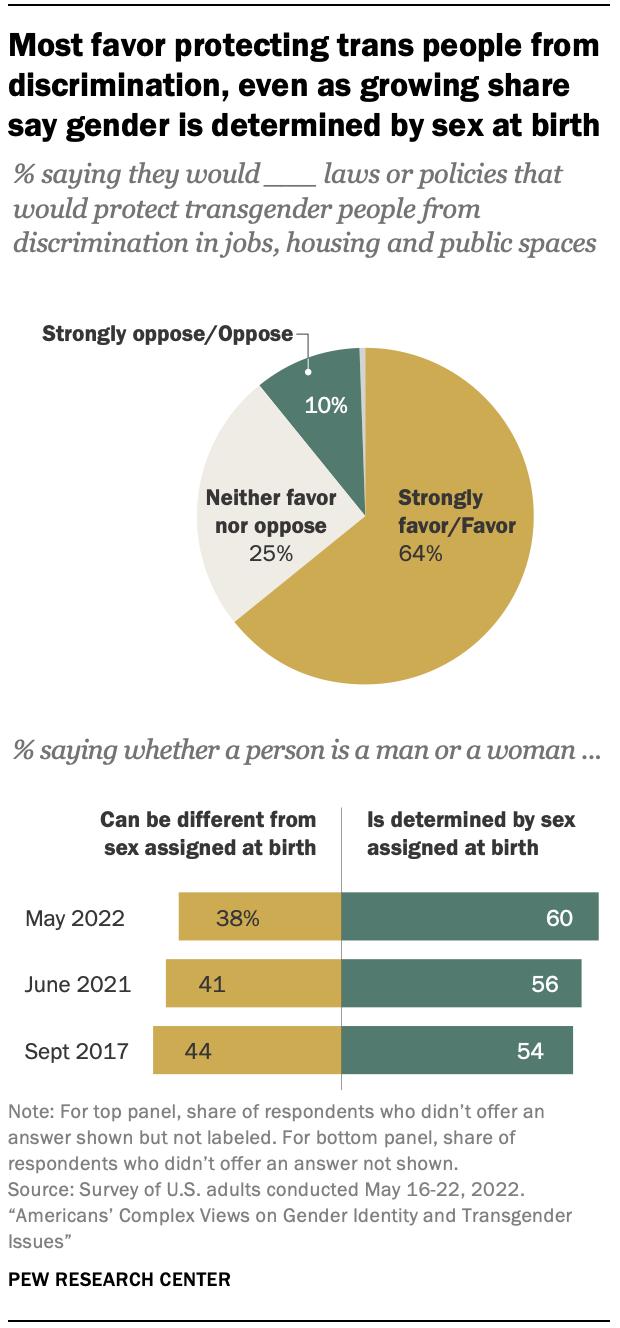
As the United States addresses issues of transgender rights and the broader landscape around gender identity continues to shift, the American public holds a complex set of views around these issues, according to a new Pew Research Center survey.
Roughly eight-in-ten U.S. adults say there is at least some discrimination against transgender people in our society, and a majority favor laws that would protect transgender individuals from discrimination in jobs, housing and public spaces. At the same time, 60% say a person’s gender is determined by their sex assigned at birth, up from 56% in 2021 and 54% in 2017.
The public is divided over the extent to which our society has accepted people who are transgender: 38% say society has gone too far in accepting them, while a roughly equal share (36%) say society hasn’t gone far enough. About one-in-four say things have been about right. Underscoring the public’s ambivalence around these issues, even among those who see at least some discrimination against trans people, a majority (54%) say society has either gone too far or been about right in terms of acceptance.
The fundamental belief about whether gender can differ from sex assigned at birth is closely aligned with opinions on transgender issues. Americans who say a person’s gender can be different from their sex at birth are more likely than others to see discrimination against trans people and a lack of societal acceptance. They’re also more likely to say that our society hasn’t gone far enough in accepting people who are transgender. But even among those who say a person’s gender is determined by their sex at birth, there is a diversity of viewpoints. Half of this group say they would favor laws that protect trans people from discrimination in certain realms of life. And about one-in-four say forms and online profiles should include options other than “male” or “female” for people who don’t identify as either.
Related: The Experiences, Challenges and Hopes of Transgender and Nonbinary U.S. adults
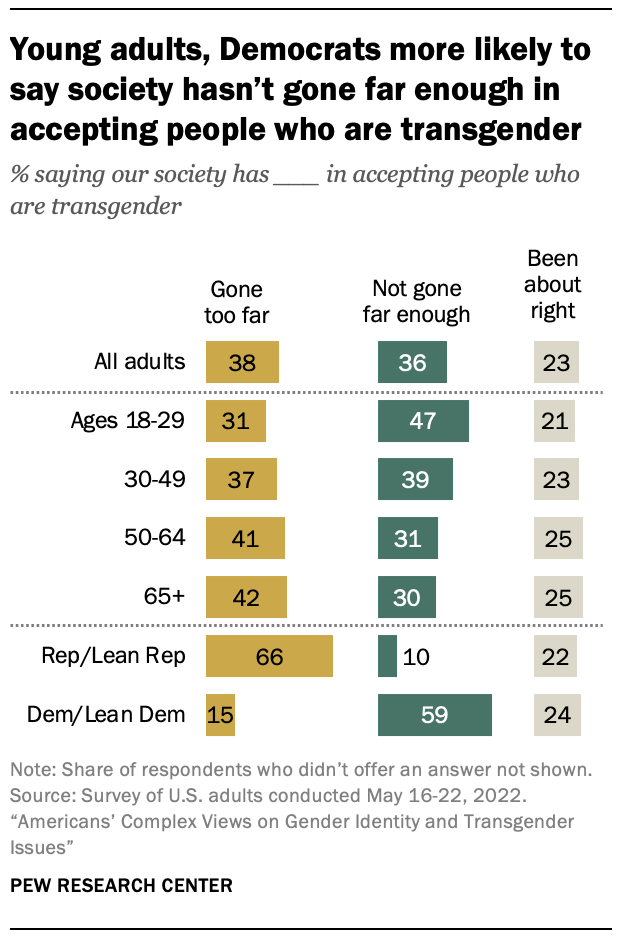
When it comes to issues surrounding gender identity, young adults are at the leading edge of change and acceptance. Half of adults ages 18 to 29 say someone can be a man or a woman even if that differs from the sex they were assigned at birth. This compares with about four-in-ten of those ages 30 to 49 and about a third of those 50 and older. Adults younger than 30 are also more likely than older adults to say society hasn’t gone far enough in accepting people who are transgender (47% vs. 39% of 30- to 49-year-olds and 31% of those 50 and older)
These views differ even more sharply by partisanship. Democrats and those who lean to the Democratic Party are more than four times as likely as Republicans and Republican leaners to say that a person’s gender can be different from the sex they were assigned at birth (61% vs. 13%). Democrats are also much more likely than Republicans to say our society hasn’t gone far enough in accepting people who are transgender (59% vs. 10%). For their part, 66% of Republicans say society has gone too far in accepting people who are transgender.
Amid a national conversation over these issues, many states are considering or have put in place laws or policies that would directly affect the lives of transgender and nonbinary people - that is, those who don’t identify as a man or a woman. Some of these laws would limit protections for transgender and nonbinary people; others are aimed at safeguarding them. The survey finds that a majority of U.S. adults (64%) say they would favor laws that would protect transgender individuals from discrimination in jobs, housing and public spaces such as restaurants and stores. But there is also a fair amount of support for specific proposals that would limit how trans people can participate in certain activities and navigate their day-to-day lives.
Roughly six-in-ten adults (58%) favor proposals that would require transgender athletes to compete on teams that match the sex they were assigned at birth (17% oppose this, 24% neither favor nor oppose).1 And 46% favor making it illegal for health care professionals to provide someone younger than 18 with medical care for a gender transition (31% oppose). The public is more evenly split when it comes to making it illegal for public school districts to teach about gender identity in elementary schools (41% favor and 38% oppose) and investigating parents for child abuse if they help someone younger than 18 get medical care for a gender transition (37% favor and 36% oppose). Across the board, views on these policies are deeply divided by party.
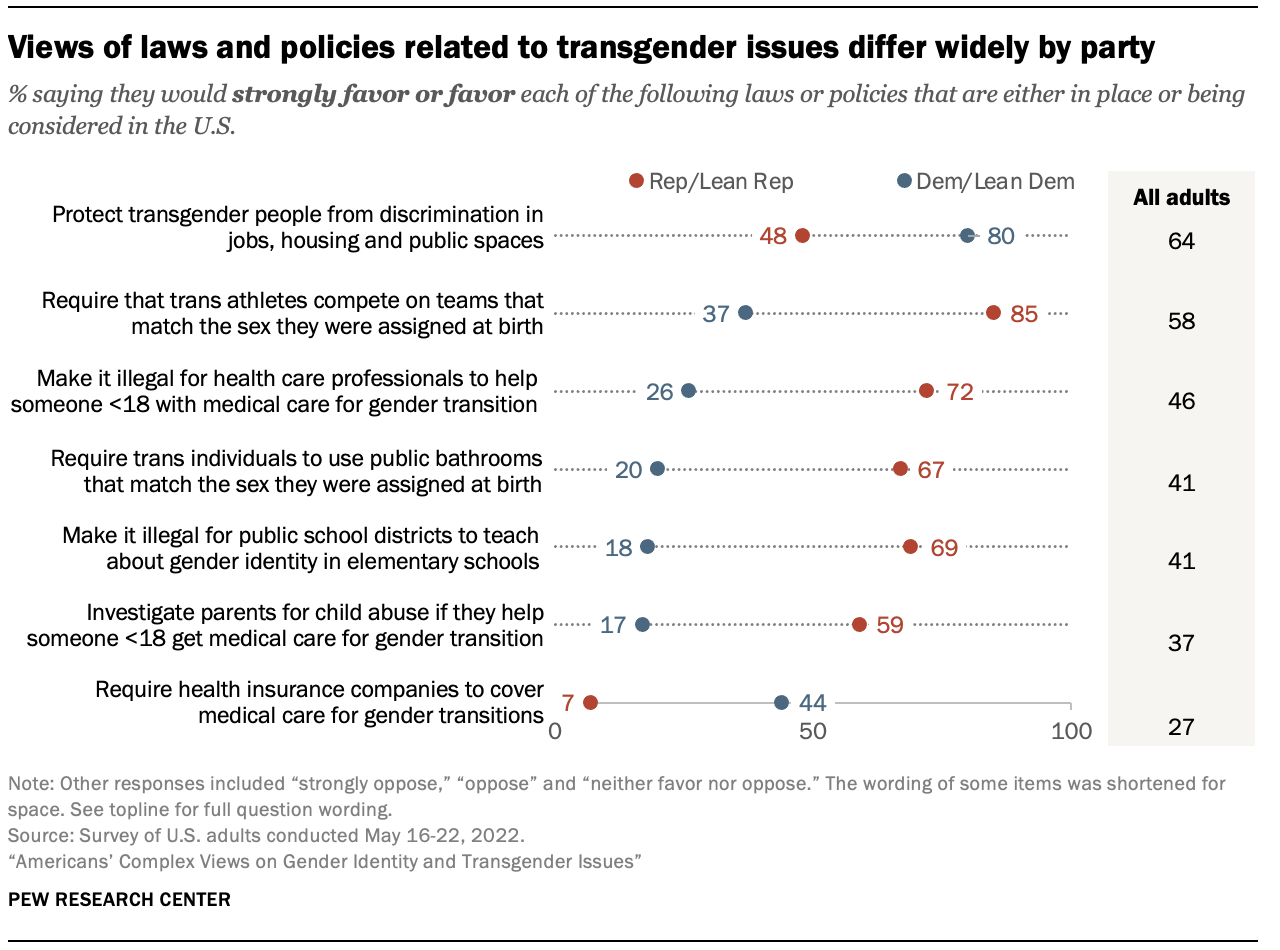
When asked what has influenced their views on gender identity - specifically, whether they believe a person can be a different gender than the sex they were assigned at birth - those who believe gender can be different from sex at birth and those who do not point to different factors. For the former group, the most influential factors shaping their views are what they’ve learned from science (40% say this has influenced their views a great deal or a fair amount) and knowing someone who is transgender (38%). Some 46% of those who say gender is determined by sex at birth also point to what they’ve learned from science, but this group is far more likely than those who say a person’s gender can be different from their sex at birth to say their religious beliefs have had at least a fair amount of influence on their opinion (41% vs. 9%).
The nationally representative survey of 10,188 U.S. adults was conducted May 16-22, 2022. Previously published findings from the survey show that 1.6% of U.S. adults are trans or nonbinary, and the share is higher among adults younger than 30. More than four-in-ten U.S. adults know someone who is trans and 20% know someone who is nonbinary. Among the other key findings in this report:
Nearly half of U.S. adults (47%) say it’s extremely or very important to use a person’s new name if they transition to a gender that is different from the sex they were assigned at birth and change their name. A smaller share (34%) say the same about using someone’s new pronouns (such as “he” instead of “she”). A majority of Democrats (64%) - compared with 28% of Republicans - say it’s at least very important to use someone’s new name if they go through a gender transition and change their name. And while 51% of Democrats say it’s extremely or very important to use someone’s new pronouns, just 14% of Republicans say the same.
Many Americans express discomfort with the pace of change around issues of gender identity. Some 43% say views on issues related to people who are transgender or nonbinary are changing too quickly, while 26% say things aren’t changing quickly enough and 28% say the pace of change is about right. Adults ages 65 and older are the most likely to say views on these issues are changing too quickly; conversely, those younger than 30 are the most likely to say they’re not changing quickly enough.
More than four-in-ten (44%) say forms and online profiles that ask about a person’s gender should include options other than “male” and “female” for people who don’t identify as either. Some 38% say the same about government documents such as passports and driver’s licenses. Half of adults younger than 30 say government documents that ask about a person’s gender should provide more than two gender options, compared with about four-in-ten or fewer among those in older age groups. Views differ even more widely by party: While majorities of Democrats say forms and online profiles (64%) and government documents (58%) should offer options other than “male” and “female,” about eight-in-ten Republicans say they should not (79% say this about forms and online profiles and 83% say this about government documents).
Democrats and Republicans who agree that a person’s gender is determined by their sex at birth often have different views on transgender issues. A majority (61%) of Democrats - but just 31% of Republicans - who say a person’s gender is determined by the sex they were assigned at birth say there is at least a fair amount of discrimination against transgender people in our society today. And while 62% of Democrats who say gender is determined by sex at birth say they would favor policies that protect trans individuals against discrimination, fewer than half of their Republican counterparts say the same.
Democrats’ views on some transgender issues vary by age. Among Democrats younger than 30, about seven-in-ten (72%) say someone can be a man or a woman even if that’s different from the sex they were assigned at birth, and 66% say society hasn’t gone far enough in accepting people who are transgender. Smaller majorities of Democrats 30 and older express these views. Age is less of a factor among Republicans. In fact, similar shares of Republicans ages 18 to 29 and those 65 and older say a person’s gender is determined by their sex at birth (88% each) and that society has gone too far in accepting people who are transgender (67% of Republicans younger than 30 and 69% of those 65 and older).
About three-in-ten parents of K-12 students (29%) say at least one of their children has learned about people who are transgender or nonbinary from a teacher or another adult at their school. Similar shares across regions and in urban, suburban and rural areas say their children have learned about this in school, as do similar shares of Republican and Democratic parents. Views on whether it’s good or bad that their children have or haven’t learned about people who are trans or nonbinary at school vary by party and by children’s age. For example, among parents of children in elementary school, 45% say either that their children have learned about this and that’s a bad thing or that they haven’t learned about it and that’s a good thing. A smaller share of parents of middle and high schoolers (34%) say the same. Republican parents are much more likely than Democratic parents to say this, regardless of their child’s age.
A rising share say a person’s gender is determined by their sex at birth
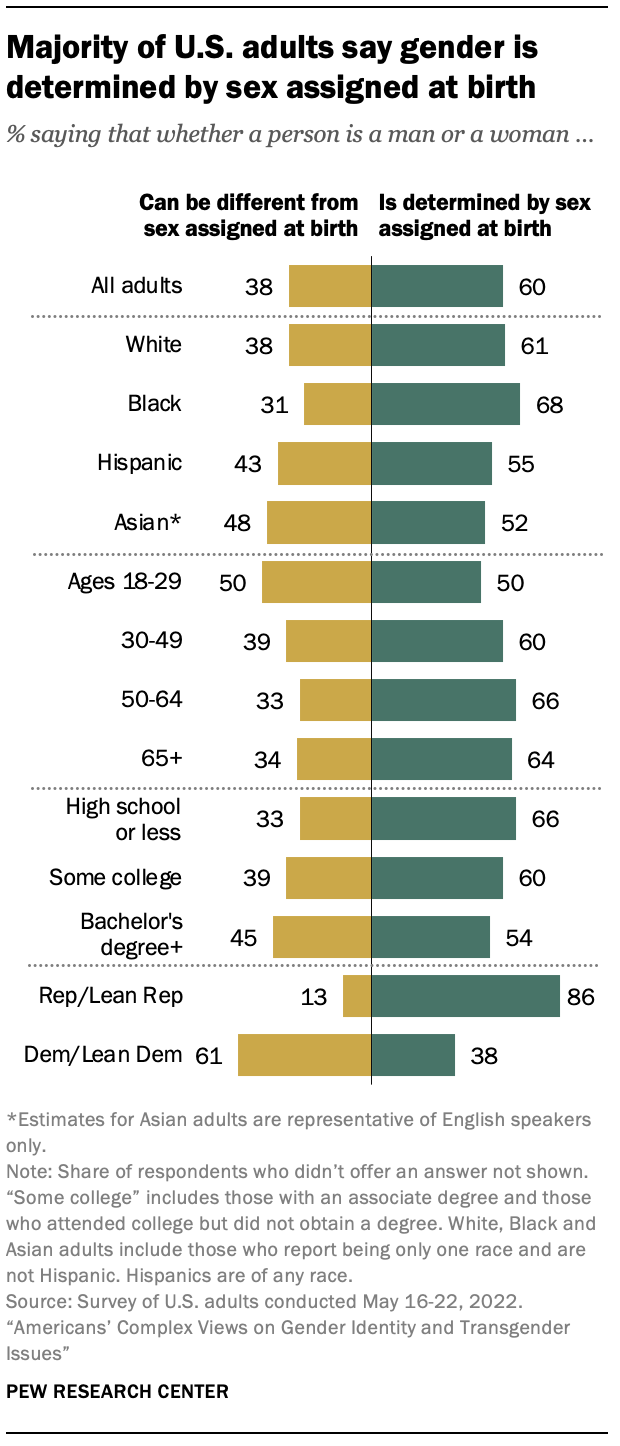
Six-in-ten U.S. adults say that whether a person is a man or a woman is determined by their sex assigned at birth. This is up from 56% one year ago and 54% in 2017. No single demographic group is driving this change, and patterns in who is more likely to say this are similar to what they were in past years.
Today, half or more in all age groups say that gender is determined by sex assigned at birth, but this is a less common view among younger adults. Half of adults younger than 30 say this, lower than the 60% of 30- to 49-year-olds who say the same. Even higher shares of those 50 to 64 (66%) and those 65 and older (64%) say a person’s gender is determined by their sex at birth.
The party gap on this issue remains wide. The vast majority of Republicans and those who lean toward the GOP say gender is determined by sex assigned at birth (86%), compared with 38% of Democrats and Democratic leaners. Most Democrats say that whether a person is a man or a woman can be different from their sex at birth (61% vs. just 13% of Republicans). Liberal Democrats are particularly likely to hold this view - 79% say a person’s gender can be different from sex at birth, compared with 45% of moderate or conservative Democrats. Meanwhile, 92% of conservative Republicans say gender is determined by sex at birth and 74% of moderate or liberal Republicans agree.
Democrats ages 18 to 29 are also substantially more likely than older Democrats to say that someone’s gender can be different from their sex assigned at birth, although majorities of Democrats across age groups share this view. About seven-in-ten Democrats younger than 30 say this (72%), compared with about six-in-ten or fewer in the older age groups. Among Republicans, there is no clear pattern by age. About eight-in-ten or more Republicans across age groups - including 88% each among those ages 18 to 29 and those 65 and older - say a person’s gender is determined by their sex at birth.
The view that a person’s gender is determined by their sex assigned at birth is more common among those with lower levels of educational attainment and those living in rural areas or in the Midwest or South. This view is also more prevalent among men and Black Americans.
A solid majority of those who do not know a transgender person say that whether a person is a man or a woman is determined by sex assigned at birth (68%), while those who do know a trans person are more evenly split. About half say gender is determined by sex assigned at birth (51%), while 48% say gender and sex assigned at birth can be different.
Though Republicans who know a trans person are more likely than Republicans who don’t to say gender can be different from sex assigned at birth, more than eight-in-ten in both groups (83% and 88%, respectively) say gender is determined by sex at birth. Meanwhile, there are large differences between Democrats who do and do not know a transgender person. A majority of Democrats who do know a trans person (72%) say someone can be a man or a woman even if that differs from their sex assigned at birth, while those who don’t know anyone who is transgender are about evenly split (48% say gender is determined by sex assigned at birth while 51% say it can be different).
Many Americans point to science when asked what has influenced their views on whether gender can differ from sex assigned at birth
When asked about factors that have influenced their views about whether someone’s gender can be different from the sex they were assigned at birth, 44% say what they’ve learned from science has had a great deal or a fair amount of influence. About three-in-ten (28%) point to their religious views and about two-in-ten (22%) say knowing someone who is transgender has influenced their views at least a fair amount. Smaller shares say what they’ve heard or read in the news (15%) or on social media (14%) has had a great deal or a fair amount of influence on their views.
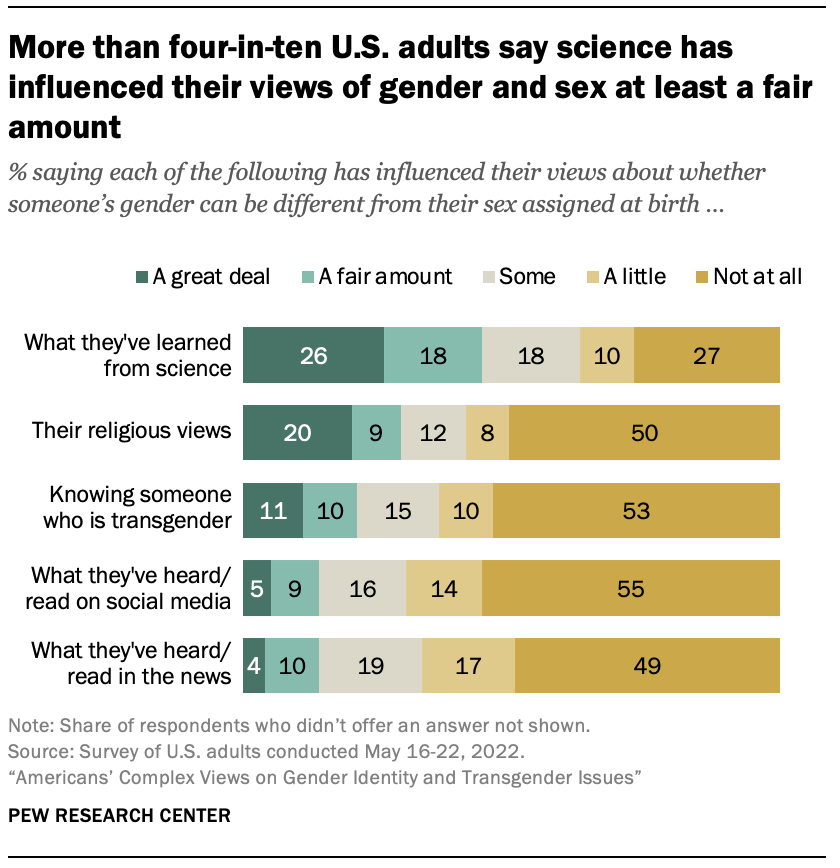
The factors people point to on this topic differ by whether or not they say gender is determined by sex at birth. Among those who say that whether someone is a man or a woman is determined by the sex they were assigned at birth, 46% say what they’ve learned from science has influenced their views on this at least a fair amount, while 41% say the same about their religious views. About one-in-ten point to what they’ve heard or read in the news (12%), what they’ve heard or read on social media (11%) or knowing someone who’s transgender (11%).
Among those who say someone can be a man or a woman even if that’s different from the sex they were assigned at birth, 40% say their views on this topic have been influenced at least a fair amount by what they’ve learned from science. A similar share say the same about knowing a transgender person (38%). Smaller shares in this group say what they’ve heard or read in the news (19%) or on social media (18%) or their religious views (9%) have had a great deal or a fair amount of influence.
Among those who say gender is determined by sex assigned at birth, adults younger than 30 stand out as being more likely than their older counterparts to say their knowledge of science (60%), what they’ve heard or read on social media (22%) or knowing someone who is trans (17%) influenced this view a great deal or a fair amount. In turn, those ages 65 and older tend to be more likely than younger age groups to cite their religious views (51% in the older group say this has had at least a fair amount of influence).
Republicans who say gender is determined by sex assigned at birth are more likely than Democrats with the same view to say their knowledge of science (52% vs. 40%) and their religious views (45% vs. 34%) have had at least a fair amount of influence, while Democrats are more likely than Republicans to say the news (17% vs. 10%), social media (16% vs. 10%) and knowing someone who is trans (15% vs. 9%) have influenced them - though the shares are still small among both groups.
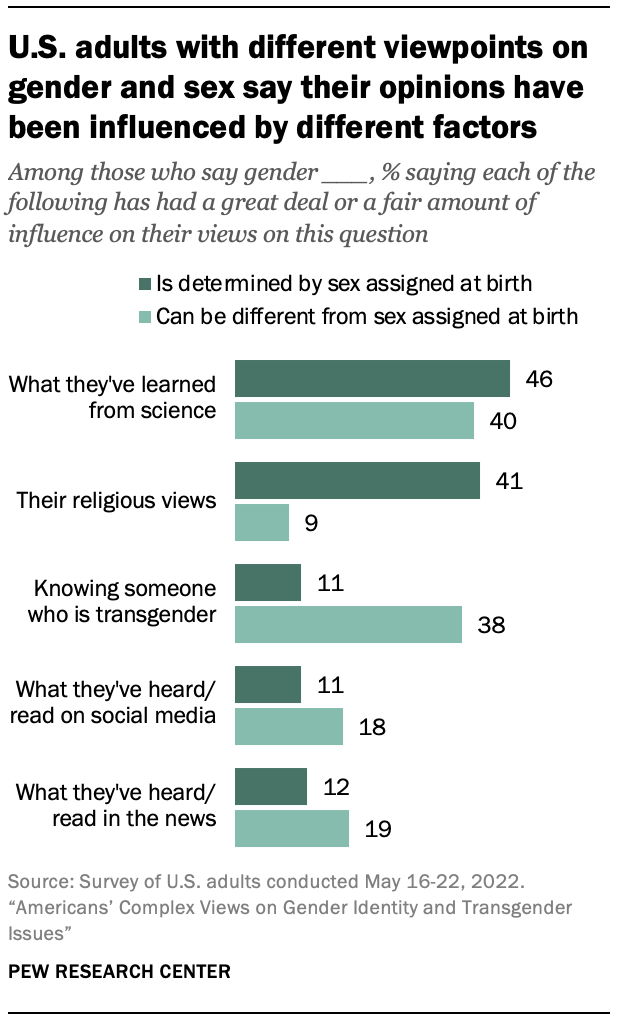
On the flip side, among those who say someone’s gender can be different from the sex they were assigned at birth, adults younger than 30 are also more likely than older adults to say social media has contributed to this view at least a fair amount (33% vs. 15% or fewer among older age groups). Adults ages 65 and older are more likely than their younger counterparts to say what they’ve learned from science has influenced their view (46% vs. 40% or fewer).
Democrats who say whether someone is a man or a woman can be different from their sex at birth are more likely than Republicans with the same view to say that what they’ve learned from science (43% vs. 26%) and knowing someone who is transgender (40% vs. 26%) has influenced their view a great deal or a fair amount.
Public sees discrimination against trans people and limited acceptance
Roughly eight-in-ten Americans say transgender people face at least some discrimination, and relatively few believe our society is extremely or very accepting of people who are trans. These views differ widely by partisanship and by beliefs about whether someone’s gender can differ from the sex they were assigned at birth.
Overall, 57% of adults say there is a great deal or a fair amount of discrimination against transgender people in our society today. An additional 21% say there is some discrimination against trans people, and 14% say there is a little or none at all.
There are modest differences in views on this issue across demographic groups. Women (62%) are more likely than men (52%) to say there is a great deal or a fair amount of discrimination against transgender people, and college graduates (62%) are more likely than those with less education (55%) to say the same.

There is, however, a wide partisan divide in these views: While 76% of Democrats and those who lean to the Democratic Party say there is a great deal or a fair amount of discrimination against trans people, 35% of Republicans and Republican leaners share that assessment. One-in-four Republicans see little or no discrimination against this group, compared with 5% of Democrats.
These views are also linked with underlying opinions about whether a person’s gender can be different from their sex assigned at birth. Among those who say someone can be a man or a woman even if that’s different from the sex they were assigned at birth, 83% say there is a great deal or a fair amount of discrimination against trans people. Even so, some 42% of those who hold the alternative point of view - that gender is determined by sex assigned at birth - also see at least a fair amount of discrimination. Among Democrats who say gender is determined by sex at birth, that share rises to 61%.
Relatively few adults (14%) say society is extremely or very accepting, while about a third (35%) say it is somewhat accepting. A plurality (44%) says our society is a little or not at all accepting of trans people.

Again, these views are strongly linked with partisanship. Democrats have a much more negative view than Republicans, with 54% of Democrats saying society is a little accepting or not at all accepting of transgender people, compared with a third of Republicans.
And, as with views of discrimination, assessments of societal acceptance are linked to underlying views about how gender is determined. Those who say one’s gender can be different from the sex they were assigned at birth see less acceptance: 56% say society is a little accepting or not accepting at all of people who are transgender. This compares with 37% among those who say gender is determined by sex at birth. Republicans who say gender is determined by sex at birth are more likely than Democrats who say the same to believe that society is at least somewhat accepting of people who are transgender (61% vs. 47%).
About four-in-ten say society has gone too far in accepting trans people
While a majority of Americans see at least a fair amount of discrimination against transgender people and relatively few see widespread acceptance, 38% say our society has gone too far in accepting them. Some 36% say society has not gone far enough in accepting people who are trans, and 23% say the level of acceptance has been about right.
These views differ along demographic and partisan lines. Young adults (ages 18 to 29) and those with a bachelor’s degree or more education are among the most likely to say society hasn’t gone far enough in accepting people who are trans. Men, White adults and those without a four-year college degree are among the most likely to say society has gone too far in this regard.
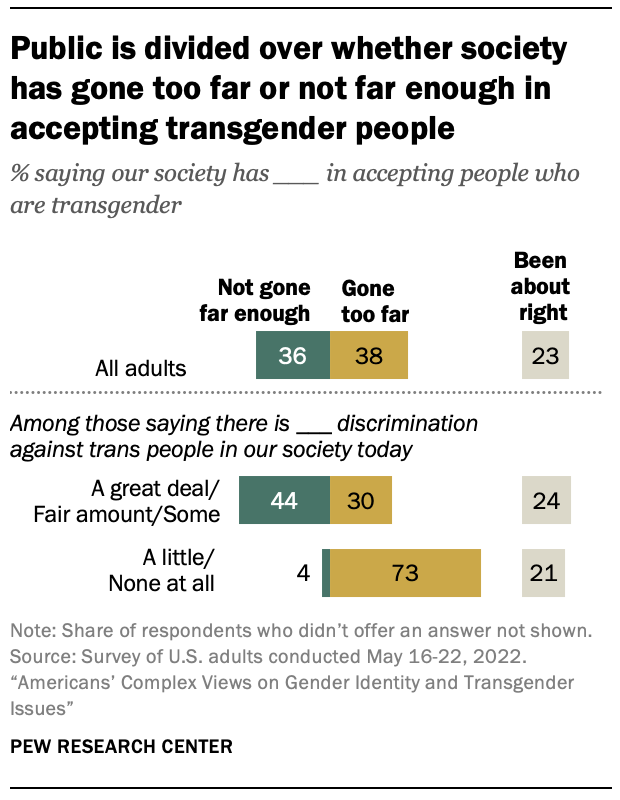
There is a wide partisan divide as well. Roughly six-in-ten Democrats (59%) say society hasn’t gone far enough in accepting people who are transgender, while 15% say it has gone too far (24% say it’s been about right). Republicans’ views are almost the inverse: 10% say society hasn’t gone far enough and 66% say it’s gone too far (22% say it’s been about right).
Even among those who see at least some discrimination against trans people, a majority (54%) say society has either gone too far in accepting trans people or been about right; 44% say society hasn’t gone far enough.
Many say it’s important to use someone’s new name, pronouns when they’ve gone through a gender transition
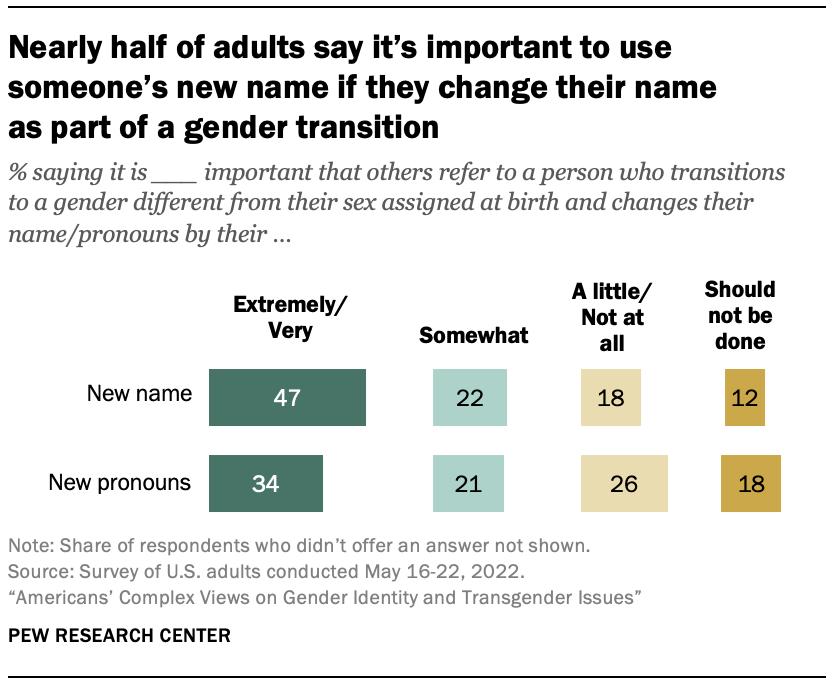
Nearly half of adults (47%) say it’s extremely or very important that if a person who transitions to a gender that’s different from their sex assigned at birth changes their name, others refer to them by their new name. An additional 22% say this is somewhat important. Three-in-ten say this is a little or not at all important (18%) or that it shouldn’t be done (12%).
Smaller shares say that if a person transitions to a gender that’s different from their sex assigned at birth and starts going by different pronouns (such as “she” instead of “he”), it’s important that others refer to them by their new pronouns. About a third (34%) say this is extremely or very important, and 21% say this is somewhat important. More than four-in-ten say this is a little or not at all important (26%) or it should not be done (18%).
These views differ along many of the same dimensions as other topics asked about. While 80% of those who believe someone’s gender can be different from their sex assigned at birth also say it’s extremely or very important to use a person’s new name when they’ve gone through a gender transition, 27% of those who think gender is determined by one’s sex assigned at birth share this opinion. The pattern is similar when it comes to use of preferred pronouns.
Democrats are much more likely than Republicans to say it’s extremely or very important to refer to a person using their new name or pronouns. When it comes to pronouns, a majority of Republicans (55%), compared with only 17% of Democrats, say using someone’s new pronouns when they’ve been through a gender transition is not at all important or should not be done.

There are some demographic differences as well, with women more likely than men and those with a four-year college degree more likely than those with less education to say it’s extremely or very important to use a person’s new name or pronouns when referring to them.
In addition, people who say they know someone who is trans are more likely than those who do not to say this is extremely or very important. Even so, substantial shares of those who don’t know a trans person view this as important. For example, 39% of those who don’t know someone who is transgender say it’s extremely or very important to refer to a person who goes through a gender transition and changes their name by their new name.
Plurality of adults say views on gender identity issues are changing too quickly
Many Americans are not comfortable with the pace of change that’s occurring around issues involving gender identity. Some 43% say views on issues related to people who are transgender and nonbinary are changing too quickly. About one-in-four (26%) say things are not changing quickly enough, and 28% say they are changing at about the right speed.
Women (30%) are more likely than men (21%) to say views on these issues are not changing quickly enough, and adults younger than 30 are more likely than their older counterparts to say the same. Among those ages 18 to 29, 37% say views on these issues are not changing quickly enough; this compares with 26% of those ages 30 to 49, 22% of those ages 50 to 64 and 19% of those 65 and older. At the same time, White adults (46%) are more likely than Black (34%), Hispanic (39%) or Asian (31%) adults to say views are changing too quickly.

Opinions also differ sharply by partisanship. Among Democrats, a plurality (42%) say views on issues involving transgender and nonbinary people are not changing fast enough, and 21% say they are changing too quickly. About a third (35%) say the speed is about right. By contrast, 70% of Republicans say views on these issues are changing too quickly, while only 7% say views aren’t changing fast enough. About one-in-five Republicans (21%) say they’re changing at about the right speed.
Respondents were asked in an open-ended format why they think views are changing too quickly or not quickly enough, when it comes to issues surrounding transgender and nonbinary people. For those who say things are changing too quickly, responses fell into several different categories. Some indicated that new ways of thinking about gender were inconsistent with their religious beliefs. Others expressed concern that the long-term consequences of medical gender transitions are not well-known, or that changing views on gender identity are merely a fad that’s being pushed by the media. Still others said they worry that there’s too much discussion of these issues in schools these days.
For those who say views are not changing quickly enough, some pointed to discrimination and a lack of acceptance of trans and nonbinary people. Others pointed to legislative initiatives in some states aimed at restricting the rights of trans and nonbinary people. Many also said that too many people in our society aren’t open to change when it comes to these issues.2
Most say they’re not paying close attention to news about bills related to transgender people
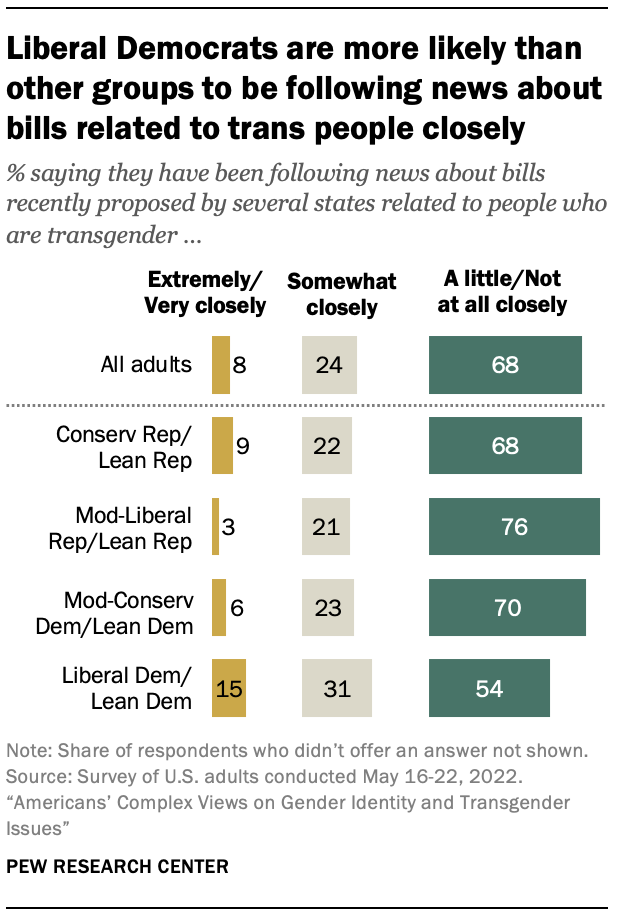
Many states are considering legislation related to people who are transgender, but a relatively small share of U.S. adults (8%) say they’re following news about these bills extremely or very closely. Another 24% say they’re following this somewhat closely, while about two-thirds say they’re following it either a little closely (23%) or not all closely (44%).3
Only about one-in-ten or less across age, racial and ethnic groups, and across levels of educational attainment, say they are following news about bills related to people who are transgender extremely or very closely. Six-in-ten or more across demographic groups say they’re following news about these bills a little closely or not closely at all.
Liberal Democrats and Democratic-leaning independents (46%) are more likely than moderate and conservative Democrats (29%) to say they are following news about state bills related to people who are transgender at least somewhat closely. Conservative Republicans and Republican leaners (31%) are more likely than their moderate and liberal counterparts (24%) - but less likely than liberal Democrats - to be following news about these bills at least somewhat closely. Still, half or more among each of these groups say they have been following news about this a little or not at all closely.
About six-in-ten would favor requiring that transgender athletes compete on teams that match their sex at birth
The survey asked respondents how they feel about some current laws and policies that are either in place or being considered across the U.S. related to transgender issues. Only two of seven items are either endorsed or rejected by a majority: 64% say they would favor policies that protect transgender individuals from discrimination in jobs, housing, and public spaces such as restaurants and stores, and 58% say they would favor policies that require that transgender athletes compete on teams that match the sex they were assigned at birth rather than the gender they identify with.

Even though there is not a majority consensus on most of these laws or policies, there are gaps of at least 10 percentage points on three items. Some 46% say they would favor making it illegal for health care professionals to provide someone younger than 18 with medical care for gender transitions, and 41% would favor requiring transgender individuals to use public bathrooms that match the sex they were assigned at birth rather than the gender they identify with; 31% say they would oppose each of these. Meanwhile, more say they would oppose (44%) than say they would favor (27%) requiring health insurance companies to cover medical care for gender transitions.
Views are more divided when it comes to laws and policies that would make it illegal for public school districts to teach about gender identity in elementary schools (41% favor and 38% oppose) or that would investigate parents for child abuse if they helped someone younger than 18 get medical care for a gender transition (37% favor and 36% oppose). Some 21% and 27%, respectively, say they’d neither favor nor oppose these policies.
Views on many policies related to transgender issues vary by age, party, and race and ethnicity
Majorities of U.S. adults across age groups express support for laws and policies that would protect transgender individuals from discrimination in jobs, housing, and public spaces such as restaurants and stores. About seven-in-ten adults ages 18 to 29 (70%) and 30 to 49 (68%) say they favor such protections, as do about six-in-ten adults ages 50 to 64 (60%) and 65 and older (59%).
But adults younger than 30 are more likely than those in each of the older age groups to say they favor laws or policies that would require health insurance companies to cover medical care for gender transitions (37% among those younger than 30 vs. about a quarter among each of the older age groups). They’re also less likely than older adults to express support for bills and policies that would restrict the rights of people who are transgender or limit what schools teach about gender identity. On most items, those ages 50 to 64 and those 65 and older express similar views.

Views differ even more widely along party lines. For example, eight-in-ten Democrats say they favor laws or policies that would protect trans individuals from discrimination, compared with 48% of Republicans. Conversely, by margins of about 40 percentage points or more, Republicans are more likely than Democrats to express support for laws or policies that would do each of the following: require trans athletes to compete on teams that match the sex they were assigned at birth (85% of Republicans vs. 37% of Democrats favor); make it illegal for health care professionals to provide someone younger than 18 with medical care for a gender transition (72% vs. 26%); make it illegal for public school districts to teach about gender identity in elementary schools (69% vs. 18%); require transgender individuals to use public bathrooms that match the sex they were assigned at birth (67% vs. 20%); and investigate parents for child abuse if they help someone younger than 18 get medical care for a gender transition (59% vs. 17%).
Overall, White adults tend to be more likely than Black, Hispanic and Asian adults to express support for laws and policies that would restrict the rights of transgender people or limit what schools can teach about gender identity. But among Democrats, White adults are often less likely than other groups to favor such laws and policies, particularly compared with their Black and Hispanic counterparts. And White Democrats are more likely than Black, Hispanic and Asian Democrats to say they favor protecting trans individuals from discrimination and requiring health insurance companies to cover medical care for gender transitions.
Sizable shares say forms and government documents should include options other than ‘male’ and ‘female’

About four-in-ten Americans (38%) say government documents such as passports and driver’s licenses that ask about a person’s gender should include options other than “male” and “female” for people who don’t identify as either; a larger share (44%) say the same about forms and online profiles that ask about a person’s gender.
Half of adults younger than 30 say government documents that ask about gender should include options other than “male” and “female,” compared with 39% of those ages 30 to 49, 35% of those 50 to 64 and 33% of adults 65 and older. When it comes to forms and online profiles, 54% of adults younger than 30 and 47% of those ages 30 to 49 say these forms should include more than two gender options; smaller shares of adults ages 50 to 64 and 65 and older (37% each) say the same.
Views on this vary considerably by party. A majority of Democrats and Democratic-leaning independents say forms and online profiles (64%) and government documents (58%) that ask about a person’s gender should include options other than “male” and “female.” In contrast, about eight-in-ten or more Republicans and Republican leaners say forms and online profiles (79%) and government documents (83%) should not include more than these two gender options.
Those who say they know someone who is nonbinary are more likely than those who don’t know anyone who’s nonbinary to say forms and government documents should include gender options other than “male” and “female.” Still, 39% of those who don’t know anyone who’s nonbinary say forms and online profiles shouldinclude other gender options, and 33% say the same about government documents that ask about a person’s gender. Conversely, 31% of those who say they know someone who’s nonbinary say forms and online profiles should not include options other than “male” and “female,” and 41% say this about government documents.
About three-in-ten parents of K-12 students say their children have learned about people who are trans or nonbinary at school
In recent months, lawmakers in several states have introduced legislation that would prohibit or limit instruction on sexual orientation or gender identity in schools. The survey asked parents of K-12 students whether any of their children have learned about people who are transgender or who don’t identify as a boy or a girl from a teacher or another adult at their school and how they feel about the fact that their children have or have not learned about this.
Some 37% of parents with children in middle or high school say their middle or high schoolers have learned about people who are transgender or who don’t identify as a boy or a girl from a teacher or another adult at their school; a much smaller share of parents of elementary school students (16%) say the same. Overall, 29% of parents with children in elementary, middle or high school say at least one of their K-12 children have learned about this at school.
Similar shares of parents of K-12 students in urban (31%), suburban (27%) and rural (32%) areas - and in the Northeast (34%), Midwest (33%), South (26%) and West (28%) - say their school-age children have learned about people who are transgender or who don’t identify as a boy or a girl. And Republican (27%) and Democratic (31%) parents are also about equally likely to say their children have learned about this in school. None of these differences are statistically significant.
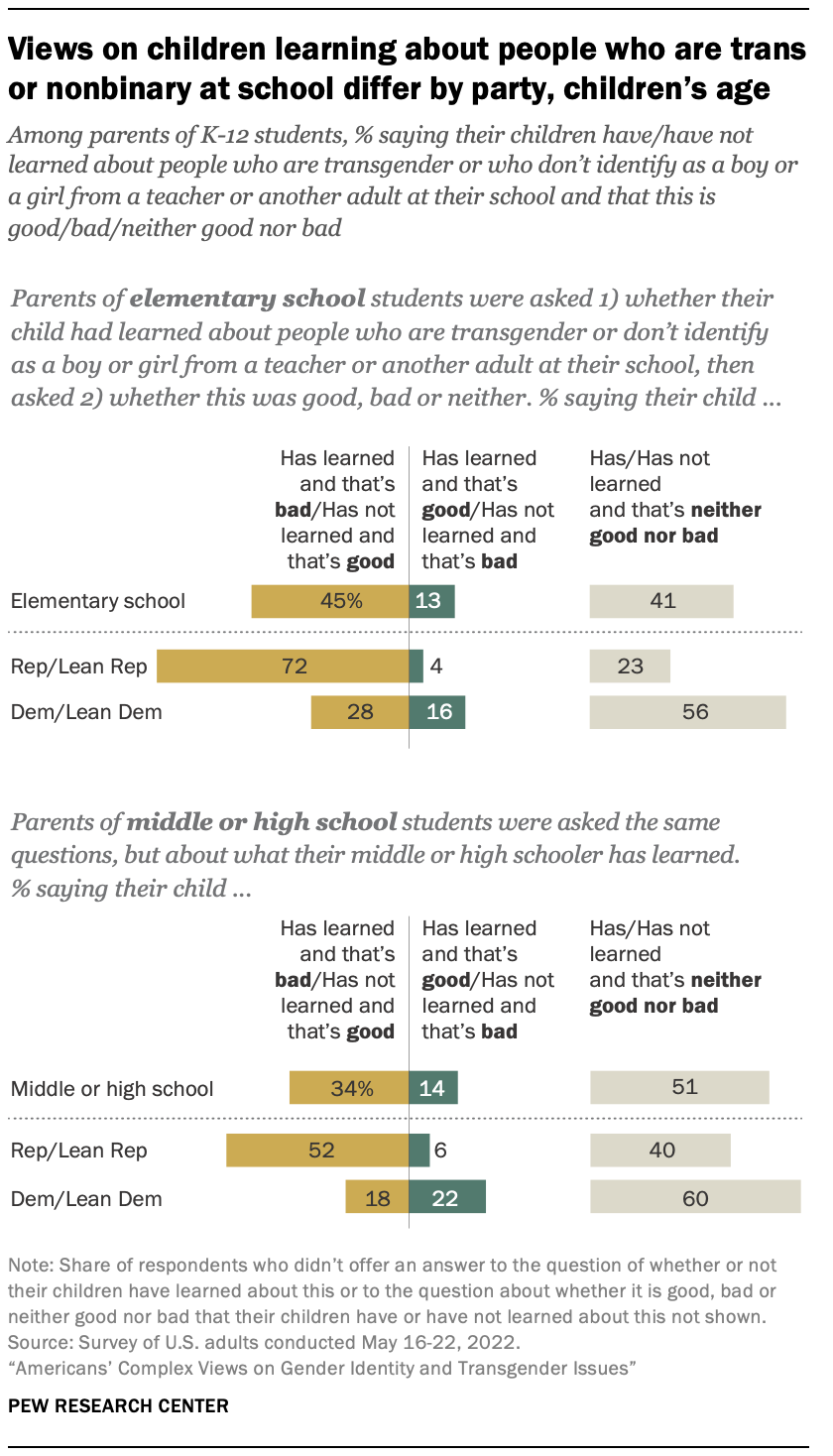
Many parents of K-12 students don’t think it’s good for their children to learn about people who are transgender or nonbinary from their teachers or other adults at school. Among parents of elementary school students, 45% either say their children have learned about people who are trans or nonbinary at school and see this is a bad thing or say their children have not learned about this and say this is a good thing. A far smaller share (13%) say it’s a good thing that their elementary school children have learned about people who are trans or nonbinary or that it’s a bad thing that they haven’t learned about this. And about four-in-ten (41%) say it’s neither good nor bad that their elementary school children have or haven’t learned about people who are transgender or nonbinary.
Among parents with children in middle or high school, 34% say it’s a bad thing that their children have learned about people who are trans or nonbinary at school or that it’s a good thing that they haven’t; 14% say it’s good that their middle or high schoolers have learned about this or that it’s bad that they haven’t; and 51% say it’s neither good nor bad that their children have or haven’t learned about this in school.
Republican and Republican-leaning parents with children in elementary, middle and high school are more likely than their Democratic and Democratic-leaning counterparts to say it’s a bad thing that their children have learned about people who are trans or nonbinary at school or that it’s a good thing that they haven’t. In turn, Democratic parents are more likely to say it’s good that their children have learned about this or bad that they haven’t. They are also more likely to say it’s neither good nor bad that their children have or haven’t learned about people who are trans or nonbinary at school.
Link nội dung: https://khoaqhqt.edu.vn/many-of-the-people-who-a59648.html